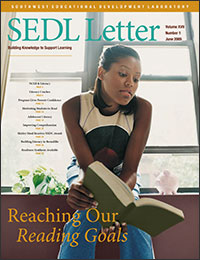Meeting Our Goals with Research
Two and a half years ago we published an issue of SEDL Letter titled "Putting Reading First." It remains our most popular issue ever. The issue won a distinguished achievement award from the Association of Educational Publishers and it has been reprinted twice. We still receive requests for copies. Because of the high demand for information about helping students become proficient readers and the increasingly high goals teachers must help their students attain, we are devoting another issue of SEDL Letter to reading topics.
 In this second reading issue, we discuss a variety of subjects—how to improve instruction for adolescent readers and struggling readers, using literacy coaching as an approach for ongoing professional development, and how to motivate students to read. Also, we visit Bernalillo, New Mexico, to see how literacy coaches have played a role in helping students at Algodones Elementary School and Bernalillo Middle School become better readers. In another article we look at the effects of Reading First in our SEDL region of Arkansas, Louisiana, New Mexico, Oklahoma, and Texas. Finally, we describe how SEDL is working with teachers in Georgia to help them turn their large numbers of Spanish-speaking students into English-language readers.
In this second reading issue, we discuss a variety of subjects—how to improve instruction for adolescent readers and struggling readers, using literacy coaching as an approach for ongoing professional development, and how to motivate students to read. Also, we visit Bernalillo, New Mexico, to see how literacy coaches have played a role in helping students at Algodones Elementary School and Bernalillo Middle School become better readers. In another article we look at the effects of Reading First in our SEDL region of Arkansas, Louisiana, New Mexico, Oklahoma, and Texas. Finally, we describe how SEDL is working with teachers in Georgia to help them turn their large numbers of Spanish-speaking students into English-language readers.
Several articles in this issue include information about the research base related to the topic being discussed. The recent focus on scientifically based research is not new. What is new is the growing responsibility of people in local educational agencies and schools to carefully consider what the research says and to understand how to use scientific evidence in their practice. When reading articles related to research—whether in SEDL Letter or other publications—it is important to remember that a single study or finding isn’t sufficient evidence to say that a certain practice works well. It is also important to understand how the study was conducted—for example, whether it was experimental, quasi-experimental, or observational—and to identify practices or suggestions that are based on philosophy, tradition, or professional judgment instead of research. We all have much to gain and learn from the growing emphasis on scientifically based research in education—as do our students. It is one of the goals of SEDL and SEDL Letter to link research and practice, and we plan to continue to do so in upcoming issues.
Happy reading!
Next Article: Required Reading - Literacy Education Under No Child Left Behind

